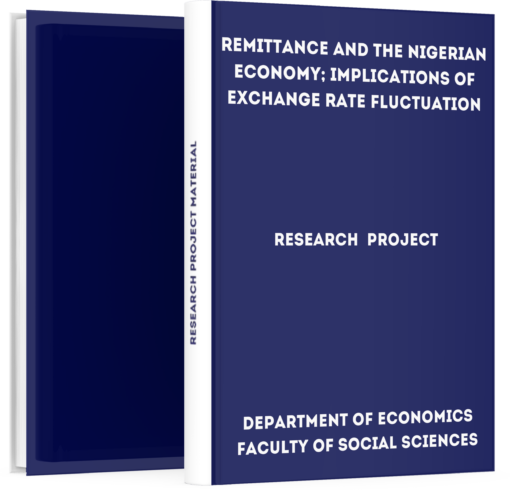Remittance and the Nigerian Economy; Implications of Exchange Rate Fluctuation
₦3,000.00
If you are interested in getting this project material “Remittance and the Nigerian Economy; Implications of Exchange Rate Fluctuation”, click on the DOWNLOAD BUTTON to make payment and the file will be delivered to your email immediately after confirmation.
Description
– Remittance and the Nigerian Economy; Implications of Exchange Rate Fluctuation –
Download Remittance and the Nigerian Economy; Implications of Exchange Rate Fluctuation. Students who are writing their projects can get this material to aid their research work.
Abstract
This work investigated the effects of remittances on the Nigerian economy taking into consideration the implications of exchange rate of fluctuations. The objective of the study is to know if exchange rate fluctuation had any significant effect on remittance in Nigeria economy.
Secondary data from the period 1981-2015 was used in this study gotten from World Bank. Ordinary least square method was employed in estimating the model. The result clearly shows that exchange rate fluctuation cannot significantly explain fluctuations in remittance.
From the findings, we observe that foreign direct investment has a significant effect on the Nigerian economy. The study recommended that the government of Nigeria should encourage investors so as to increase the flow of FDI in the country.
Introduction
1.1 Background of the Study
Remittance consist of goods or funds transferred by individuals living and working abroad to their home countries, IMF(1999).Carrasco and Bun (2007) showed that remittance can be used for different purposes in different countries but it is commonly depended on for the cost of living, education and investment.
The number of Nigerians living and working abroad has been increasing as they consider emigration to other countries where labour pays well as an escape from hardship as a means of generating capital for investment. World Bank (2008) showed that Nigeria ns abroad grew the economy by $ 7 billion in the year 2008 and that Nigeria is the sixth highest destination of remittance from its citizens.
Hernandez and Bun (2006) observed that Nigeria is the largest recipient of remittances in sub –Saharan Africa. According to the Central Bank of Nigeria (CBN), Nigeria received approximately us $ 2.26 billion in remittances in 2004.
How to Download this Project Material
First, note that we are one of the best and most reliable online platforms because we don’t retain any of your personal information or data as regards making payments online.
PRICE: ₦3,500 ₦3,000 (Three Thousand Naira Only)
Make a bank deposit or mobile transfer of ₦2,000 only to the account given below;
Bank Name: UBA Account Number: 1022564031 Account Name: TMLT PRO SERVICES
After making the payment, CLICK HERE to send the following on WhatsApp;
- Depositor’s Name or Screenshot of Payment
- Name of the Past Question
- Active Email Address
or Call Us On +2348082284439 Once your details have been received and your payment confirmed by us, you will receive the past question in your email or WhatsApp within 5 Minutes.
Guarantee of Getting the Material
We understand that due to the high rate of fraud, many people are afraid of making purchases online but be rest assured that PastExamQuestions will deliver your material after payment.
Once your details have been received and your payment confirmed by us, you will receive the past question in your email or WhatsApp.
Give us Feedback
Have we been able to satisfy you? How well do you think the material will be helpful after having gone through it? Does the price worth the material?
Let’s hear from you! We recommend that our customers give feedback at the end of every transaction to enable us to serve better. You can do this by clicking the review button on this page.
Where is the review button? >> Just scroll up to where you see reviews





Reviews
There are no reviews yet.